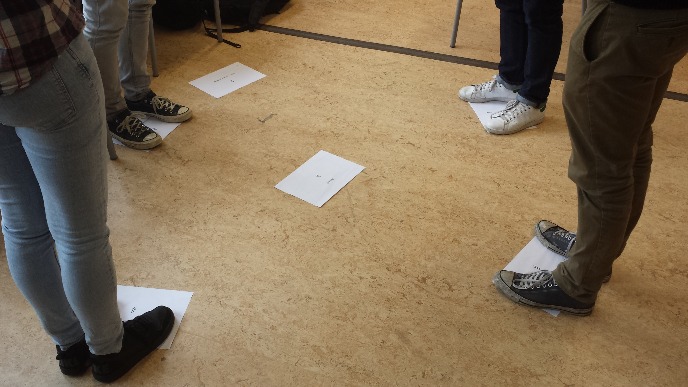
Systemic Constellation Method
Introduction
SCOPE’s educational activities focus on broadening horizons and seeing the bigger picture and facilitate an embodied experience. One of the methods we use to achieve this in our education is the systemic constellation method. This method is based on systemic perspective and fits well with experience-based learning of SCOPE. The systemic perspective and the systemic constellation method were successfully used in education in recent years and proved very suitable.
In short, the systemic constellation method enables to make explicit the implicit, internal mental image that an individual or group has of (an issue in) a social system. By social systems teams, organisational, communities, societal groups or any group of people are meant. By visualizing the implicit, internal image and placing it in a larger social context, structures, mutual relationships and order can be explored. This allows individuals or groups to develop new perspectives, insights and ideas about the dynamics in a social system. More details about the method can be found in the publications below.
This systemic constellation method is already widely used by companies and government organizations in leadership development, change processes and team building, to name a few. Its application in education is relatively new and has not yet been the subject of much research. Therefore, in order to improve its educational activities, SCOPE is conducting research into the efficacy and applicability of the methods used. Salome Scholtens started a research line on the study of the systemic constellation method, to study the application in education and to contribute to our understanding of the method in general.
More details about the method can be found in the publications below and in the description of the Teaching Practice.
If you are interested in this research or if you want to contribute, please contact Salome Scholtens.

Research in progress
Study on the international community of professionals using the Systemic Constellation Method
In recent decades, trainers, consultants, coaches, and other professionals, worldwide, have adopted this method, often acquired through self-education. However, currently there is almost no insight in this professional community or on how and when they apply it in organisations, teams or education. We implemented a survey for this international community. More details about this study can be found at the Open Science Framework Registry .
Study on systemic constellations as non-verbal language
Although the use of the systemic constellation is widespread, we still do not fully understand how it works. In this study we explore systemic constellations as a non-verbal language. More details about this study can be found at the Open Science Framework Registry .
Recent publications
Scholtens, S., Kiltz, L., Boer, H., Konkolÿ Thege, B., & Fleer, J. (2023). Conceptualisation of the systemic organisational constellation method and a procedure for its application in coaching. Coaching: An International Journal of Theory, Research and Practice, 1-15.
Scholtens, S., Boer, H., Kiltz, L., & Fleer, J. (2023). A Systemic Perspective on Organizations: International Experience with the Systemic Constellation Method. Systemic Practice and Action Research, 1-18.
Scholtens, S., Barnhoorn, P. C., Fleer, J. (2023). Education to support professional identity formation in medical students: guiding implicit social learning. International Journal of Medical Education, 14, 19-22.
Konkolÿ Thege, B., Petroll, C., Rivas, C. & Scholtens, S. (2021). The Effectiveness of Family Constellation Therapy in Improving Mental Health: A Systematic Review. Family process, 60(2), 409-423.
Scholtens, S., Petroll, C., Rivas, C., Fleer, J. & Konkolÿ Thege, B. (2021). Systemic constellations applied in organisations: a systematic review. Gio-Gruppe-Interaktion-Organisation-Zeitschrift fuer angewandte organisationspsychologie, 52(3), 537-550.

Master theses
Social-Spatial Perception from an Observer’s Perspective. Kingma, R. (2022)
Systemic perspective in Organisations. Bhalla, S. (2022)
Further reading
In 2021, the earlier-mentioned systematic reviews of the scientific literature on organisational constellations and family constellations was published. Below is a short list of other scientific publications on systemic constellation work.
Organisational constellations
Kolodej, C., Schröder, J. and Kallus, K. W. (2016). Evaluation systemischer Strukturaufstellungen im Organisationskontext [Evaluation of systemic structural constellations within an organisational context]. Gruppe. Interaktion. Organisation. Zeitschrift für Angewandte Organisationspsychologie (GIO), 47(1), 61–71.
Burchardt, C. (2015). Business coaching and consulting - the systemic constellation approach in business. In M. Schabacker, K. Gericke, N. Szélig, and S. Vajna (Eds.), Modelling and management of engineering processes (pp. 101-112). Springer-Verlag.
Kopp, U., and Martinuzzi, A. (2013). Teaching Sustainability Leaders in Systems Thinking . Business Systems Review, 2(2), 191-215.
Borek, L. (2011). Team structural constellations and intra-team conflict. Team Performance Management, 17 (7/8), 405-427.
Roevens, J. (2009) Systemic constellations work in organizations. PhD Thesis on organisational constellations.
Groth, T. (2004). Organisationsaufstellung — ein neues Zauberinstrument in der Beratung? [Organisational constellation - a new magic tool in consulting?] Gruppendynamik und Organisationsberatung, 35(2), 171-184.
Family constellations
Konkolÿ Thege, B. et al (2022). The Effectiveness of Family Constellation Therapy in Reducing Psychopathological Symptoms in a Naturalistic Setting. Psychiatria Danubina, 34(3), 497-505. doi: 10.24869/psyd.2022.497.
Gyimesi, J. (2022). Family Constellation Therapy in the Context of Esotericism . Perspectives on Psychological Science.
Perazzoli, S., de Santana Neto, J.P. (2022). Prospecting Technological Tools to Progress in Systemic Constellation Research and Development .
Siqueira-Campos, V.M. et al (2021). Dysfunctional Parenting Styles Are Associated with Mental Disorders and Low Self-Efficacy Beliefs in Brazilian Undergraduate Medical Students . BioMed Research International.
Weinhold J., Bornhauser A., Hunger C., Schweitzer J. (2014). Triple efficacy. The Heidelberg study on systems constellation. Carl-Auer.
Hunger, C. et al (2015). Mid- and Long-Term Effects of Family Constellation Seminars in a General Population Sample: 8- and 12-Month Follow-Up. Familiy Process 54 (2).
| Last modified: | 17 July 2024 09.11 a.m. |
